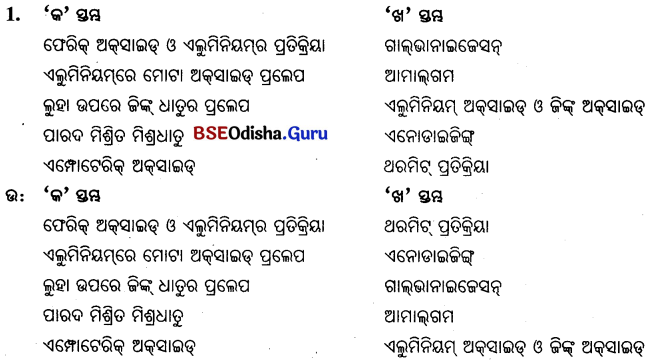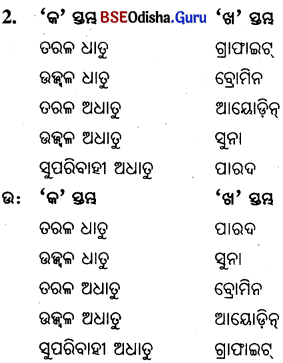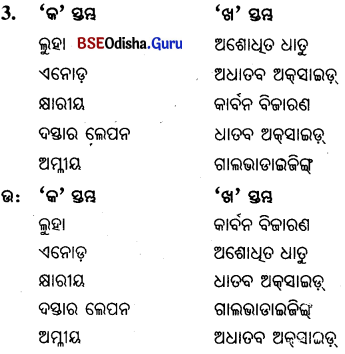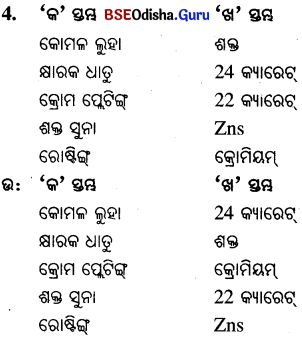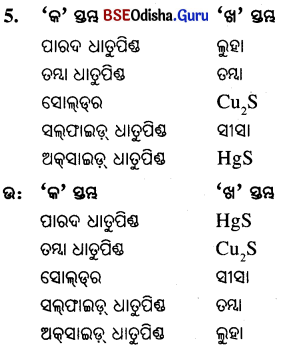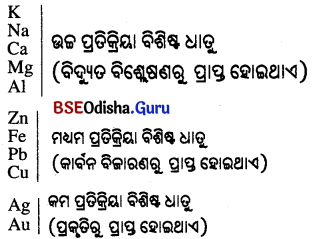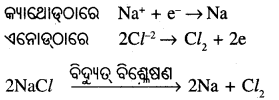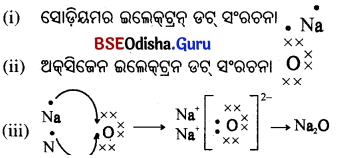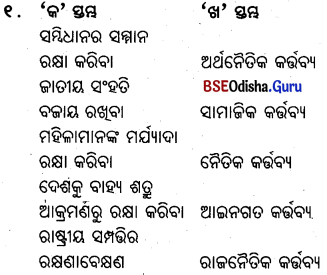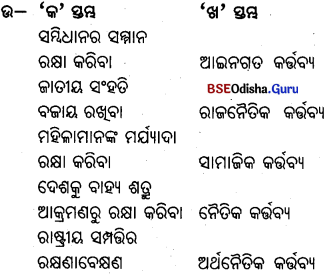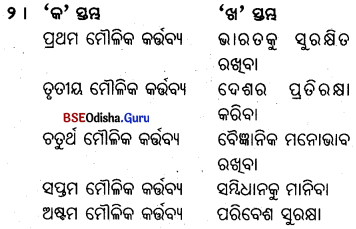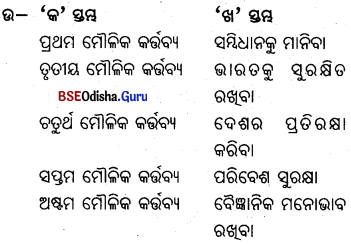Odisha State Board CHSE Odisha Class 12 Invitation to English 2 Solutions Non-Detailed Chapter 3 Mystery of the Missing Cap Textbook Exercise Questions and Answers.
Class 12th Invitation English Non-Detailed Chapter 3 Mystery of the Missing Cap Question Answers CHSE Odisha
Mystery of the Missing Cap Class 12 Questions and Answers
Unit- I
Gist:
The writer takes us back to the early days of independent India. He acquaints the readers with Shri Moharana who was rich and an ideal host. He was known for his sense of duty and generosity. With the attainment of independence, a caste of patriots became a dominant force in India. Every village witnessed not only different castes, but some lovers of country as well. Moharana’s hospitality was reflected in the service of fish, especially to the emerging breed of patriots. He nurtured the ambition to become an MLA. Those who supported him in his aspiration thought that his maiden entry into politics should enjoy the blessing of Virkishore, the Minister of Fisheries and Fine Arts. Those were the days when a minister’s daily routine was mainly to deliver speeches at public receptions. The writer recounts for the minister’s reception led by Sri Moharana. Hectic preparation was on in for a fortnight. The children of the village lower primary school practised welcome song for Virkishore.
ସାରମର୍ମ :
ସ୍ଵାଧୀନ ଭାରତର ପରବର୍ତ୍ତୀ ସାମାଜିକ ରାଜନୀତିକ ଅବସ୍ଥାକୁ ନେଇ ଏହି ଗଳ୍ପଟି ରଚିତ ହୋଇଛି । ଶ୍ରୀ ମହାରଣା ଥିଲେ ଖୁବ୍ ସମ୍ଭ୍ରାନ୍ତ ଓ ଆଦର୍ଶ ଅତିଥ୍ୟସତ୍କାରକାରୀ । କର୍ତ୍ତବ୍ୟପରାୟଣ ବ୍ୟକ୍ତି ଭାବରେ ସେ ଖ୍ୟାତି ଅର୍ଜନ କରିଥିଲେ । ଦେଶ ସ୍ଵାଧୀନତା ପାଇବା ସହିତ ଦେଶରେ ସୃଷ୍ଟି ହୋଇଥିଲେ ଦଳେ ତଥାକଥିତ ଦେଶପ୍ରେମୀ । ପ୍ରତ୍ୟେକ ଗାଁରେ ବିଭିନ୍ନ ଜାତି ସହ କେତେକ ଦେଶପ୍ରେମୀ ରହିଥିଲେ । ଏହି ଦେଶପ୍ରୀତି ଥିବା ବ୍ୟକ୍ତିମାନଙ୍କ ନିମନ୍ତେ ମହାରଣାଙ୍କର ଆତିଥ୍ୟ ପ୍ରକାଶ ପାଇଥିଲା । ସେ ଜଣେ ବିଧାୟକ ହେବାପାଇଁ ଆଶା ପୋଷଣ କରିଥିଲେ । ସେ ଭାବିଥିଲେ ତାଙ୍କର ପ୍ରଥମ ବିଜୟ ମତ୍ସ୍ୟ ଓ କଳା ବିଭାଗର ମନ୍ତ୍ରୀ ବୀରକିଶୋରଙ୍କର ଆଶୀର୍ବାଦରୁ ହେବ । ସେହି ସମୟରେ ଜଣେ ପ୍ରଥମ ବିଜୟ ମତ୍ସ୍ୟ ଓ କଳା ବିଭାଗର ମନ୍ତ୍ରୀ ବୀରକିଶୋରଙ୍କର ଆଶୀର୍ବାଦରୁ ହେବ । ସେହି ସମୟରେ ଜଣେ
ଆସିବାର ପନ୍ଦର ଦିନ ପୂର୍ବରୁ ମହାରଣାଙ୍କଦ୍ୱାରା ପ୍ରସ୍ତୁତି କାର୍ଯ୍ୟ ଚାଲିଥିଲା । ବୀରକିଶୋରଙ୍କୁ ସ୍ଵାଗତ କରିବାପାଇଁ ନିମ୍ନ ପ୍ରାଥମିକ ବିଦ୍ୟାଳୟର ପିଲାମାନେ ସ୍ବାଗତ ସଙ୍ଗୀତ ଗାଇବା ଅଭ୍ୟାସ କରିଥିଲେ ।
Glossary :
recounting: narrating (ବର୍ଣ୍ଣନା କରି )
episode: event (ଘଟଣା)
raise a laugh: ହସ ସୃଷ୍ଟି କରିଥିଲା
on the contrary : ଅପରପକ୍ଷେ
sympathy: ସହାନୁଭୂତି
well-to-do: rich (ସ୍ଵଚ୍ଛଳ)
on the eve of : ଠିକ୍ ପୂର୍ବରୁ/ଆରମ୍ଭରୁ
attraction: ଆକର୍ଷଣ
folks: people (ଲୋକ)
nearby: ନିକଟସ୍ଥ
carried out: executed (ସମ୍ପାଦନ କରାଗଲା )
host: ଅତିଥ୍
time immemorial: ଆବହମାନ କାଳରୁ
emerging: ଆବିର୍ଭାବ ହେବା
boost: to increase (ବଦ୍ଧିତ କରିବା)
honour: respect (ସମ୍ମାନ)
nursed: nurtured (ପୋଷଣ କଲେ)
ambition: ଆକାଂକ୍ଷା/ଇଚ୍ଛା
incident: event (ଘଟଣା)
outset: beginning (ଆରମ୍ଭ)
endeavour: effort (ପ୍ରଚେଷ୍ଟା)
matured: grew (ପାକଳ ହୋଇଥିଲା|
full-fledged: ସମ୍ପୁର୍ଣ୍ଣ
portfolios: ବିଭାଗମାନ
sponsors : a person who first puts forward a proposal (ପ୍ରସ୍ତାବ ଆଗତକାରୀ)
debut: first appearance (an ପଦାର୍ପଣ )
reception: ସ୍ୱାଗତ
huge: ପ୍ରଚୁର
ancestral: ପୂର୍ବପୁରୁଷ ସମ୍ପର୍କିତ
symbolism: The white-washed house stood as a symbol of new, independent India
century: a hundred years (ଶତାବ୍ଦୀ)
considerable: substantial
reputation: fame
conscientious: a person who is guided by a sense of duty
generous: a person who is ready to give freely (ଦୟାଳୁ)
exemplary : serving as a model
laced: ଖଣ୍ଡିତ
devoted: spent (ଅତିବାହିତ କରିଥିଲେ)
strange: ଅଦ୍ଭୁତ
phenomena: facts (ଘଟଣାବଳୀ)
seamstress: a woman who can sew(ସ୍ତ୍ରୀ-ଦରଜି)
wrought by: brought by (ଅଣାଯାଇଥିଲା )
poetic: କାବ୍ୟକ
refrain of the song : ଗୀତରୁ ଦୂରେଇ ରୁହନ୍ତୁ
echoes: ପ୍ରତିଧ୍ୱନି
literal: ସାହିତ୍ୟିକ
mighty: powerful (ଶକ୍ତିଶାଳୀ )
catalogued: made a list of things (ତାଲିକା ପ୍ରସ୍ତୁତ କରାଗଲା )
blushed: ଲଜ୍ଜା ଅନୁଭବ କରିଥିଲେ
recited: ଆବୃତ୍ତି କଲେ
raga: ରାଗ
wrangled: argued (ଯୁକ୍ତି କରିଥିଲେ )
throbbing: ଛାତି ଥରିବା
stopped: arrived (ପହଞ୍ଚିଲେ)
hectically: ଅବିଶ୍ୱସନୀୟ ଭାବରେ
excited: ଉତ୍ତେଜିତ ହୋଇଗଲେ
gave up: ତ୍ୟାଗ କଲେ
prior: ପୂର୍ବବର୍ତ୍ତୀ

Think it out
Question 1.
What impression of Sri Moharana do you get from the text?
Answer:
Sri Moharana, the pivot of the extract, is a rich man. He is the only person to own a beautiful building in an area of twenty villages. He is considerably known for his conscientiousness and generosity. He is a benevolent host. He is a happy villager. The early days of post-independent India witnessed Moharana in a new light. He emerges as a patriot ahead of others. He is ambitious of becoming a Member of the Legislative Assembly. He is a die-hard sycophant and an able organizer.
Question 2.
Who is Babu Virkishore? How does the narrator describe him?
Answer:
Babu Virkishore, the Minister of Fisheries and Fine Arts, belongs to the narrator’s district. He carves out a name for himself in politics. Against this backdrop, Moharana’s first appearance as a politician needs his blessing. His daily routine comprises speech making at public receptions. Sri Moharana and his supporters look forward to honouring Babu Virkishore for his stature in politics.
Question 3.
What idea of the narrator do you get from this unit of the text?
Answer:
At first, we get the impression of the narrator as a keen observer of human nature. The way he has portrayed Sri Moharana and Babu Virkishore is a case in point. He is an adept in the art of portraying Sri Moharana with the radiance of delightful manner. The extract reveals that his language is simple, natural and vivid. The writer is a superb first-person narrator.
Question 4.
How does the narrator recount the preparation for the Minister’s reception?
Answer:
The narrator vividly recounts the preparation for the minister’s reception. He remembers how Sri Moharana gave a beautiful touch to his ancestral cane chair. For fifteen days, the children of the village lower primary school spent time in practicing the welcome song. The narrator says that the song still lingers in his memory. Moharana’s excitement knew no bounds. He took minute care of all the arrangements. Nervousness and uncertainty stared him in the face.
Unit – II
Gist:
The moment Shri Moharana and others had waited for came at last. Soon after his arrival, the former lavishly garlanded the minister who instead of getting into the jeep preferred to walk. Moharana and his friends responded to his gesture with great delight. Shouts of ‘Babu Virkishore ki jai’ rent the air. The procession continued with all the people alternatively shouting and looking at the minister with their mouths wide open. At last Sri Moharana profusely entertained the minister and his followers. At first they were offered fine coconut juice. Then they were treated to the most fabulous lunch the narrator had ever seen. Now it was time for the minister to take rest. The narrator refers to his eagerness to be as physically close to him as possible.
ସାରମର୍ମ :
ଶେଷରେ ସେହି ମୁହୂର୍ଭ ଉପସ୍ଥିତ ହେଲା, ଯେଉଁ ମୁହୂର୍ଭଟିକୁ ଶ୍ରୀ ମହାରଣା ଓ ଅନ୍ୟମାନେ ଅପେକ୍ଷା କରିଥିଲେ । ମନ୍ତ୍ରୀ ମହୋଦୟଙ୍କର ଆଗମନ ପରେ ଗାଁର ବାହାର ଫାଟକଠାରୁ ତାଙ୍କୁ ଫୁଲତୋଡ଼ା ଦେଇ ପାଛୋଟି ଅଣାଗଲା । ସେ ଜିପ୍ରେ ଆସିବା ପରିବର୍ତ୍ତେ ଚାଲିଚାଲି ଆସିବାପାଇଁ ପସନ୍ଦ କଲେ । ମନ୍ତ୍ରୀ ମହୋଦୟଙ୍କର ଏହି ଭଙ୍ଗୀକୁ ମହାରଣା ଓ ତାଙ୍କ ବନ୍ଧୁମାନେ ଆନନ୍ଦରେ ଉପଭୋଗ କରୁଥିଲେ । ‘ବାବୁ ବୀରକିଶୋର କି ଜୟ’’ ଧ୍ଵନି ବାୟୁମଣ୍ଡଳକୁ ପ୍ରକମ୍ପିତ କରୁଥିଲା । ସମସ୍ତ ଲୋକମାନଙ୍କ ମଧ୍ୟରେ ମନ୍ତ୍ରୀ ମହୋଦୟ ଚାଲୁଥିଲେ । ଶେଷରେ ଶୋଭାଯାତ୍ରା ମହାରଣାଙ୍କ ଘରେ ପହଞ୍ଚିଲା । ମହାରଣା ମନ୍ତ୍ରୀ ମହୋଦୟ ଓ ତାଙ୍କର ସହକାରୀମାନଙ୍କୁ ପଇଡ଼ ପାଣି ପିଇବା ପାଇଁ ଦେଇ ଆପ୍ୟାୟିତ କରିଥିଲେ । ତା’ପରେ ଉତ୍ତମ ଭୋଜନର ବ୍ୟବସ୍ଥା କରାଯାଇଥିଲା । ଭୋଜନ କରିସାରିଲା ପରେ ମନ୍ତ୍ରୀ ମହୋଦୟ ବିଶ୍ରାମ ନେଲେ ।

Glossary:
the big day: the day the minister arrived (ମହନୀୟ ଦିବସ)
welcome arch : ସ୍ୱାଗତ ତୋରଣ
outskirts of village: ଗାଁ ଦାଣ୍ଡରେ ବାହାରେ
profusely: lavishly,sufficiently(ପ୍ରଚୁର ପରିମାଣରେ )
garlanded: ଫୁଲମାଳ ଦିଆଗଲା
destination: ଗନ୍ତବ୍ୟସ୍ଥଳ
furlong away: ଅଳ୍ପ ଦୂରରେ
destiny: ଭାଗ୍ୟ ପରୀକ୍ଷା
statement: ମନ୍ତବ୍ୟ
applauded: expressed praise by clapping(ପ୍ରଶଂସାସୂଚକତାଳି ମାରିଲେ)
elephantine: ଗୋଦରଗୋଡ଼ିଆ
plodded:walked slowly with heavy steps (ଚାଲିଲେ)
embarrassment: shy, ashamed
shrunken neck: କଣ୍ଟକିତ ଗ୍ରୀବା
Contented : pleased (ଖୁସି ହେଲା )
invalids: ଅକାର୍ୟ୍ୟ
alternatively : ବିକଳ୍ପ ଭାବରେ
gaping: ନିରେଖି ଚାହିଁବା
half-naked : ଅର୍ଦ୍ଧନଗ୍ନ
pot-bellied : ବଡ଼ ପେଟିଆ
guilty: ଦୋଷୀ
entourage: people who follow anImportant person(ପ୍ରଶଂସକ)
set apart: arranged separately(କରାଯାଇଥିଲା )
tender coconut juice : ପଇଡ଼ପାଣି
giant: ବିରାଟକାୟ
repose: rest (ବିଶ୍ରାମ)
mustering: gathering (ଏକତ୍ରିତ କରି)
self-confidence : ଆତ୍ମବିଶ୍ଵାସ
grove: ଅଙ୍କୁଶ
Think it out
Question 1.
How does the narrator describe the procession of the Minister in the village?
Answer:
The writer gives a beautiful description of the procession of the minister in the village. The minister walked slowly with the heavy steps through the village street amidst the thunderous applause and slogans in priase of the minister. Everyone in the village including the invalids took part in it, shouting slogans by turn and opening their mouths wide open.
Question 2.
How did Sri Moharana entertain his guests?
Answer:
When the procession reached Moharana’s house, Moharana lavishly entertained his guests. They were given tender coconut juice and treated to the most fabulous lunch the narrator had ever seen. The lunch Moharana had hosted comprised twenty dishes that were arranged around the sweetened, ghee-backed rice. After his lunch, the minister took rest in a cabin.
Unit – III
Gist:
The sight of the minister snoring heavily made the narrator not only ‘speechless’ but ‘witless’ as well. He witnessed Jhandoo, all on a sudden, advanced fast towards the window, picked up the minister’s cap and vanished into the grove. The writer was at a loss. He did not know which to give more importance – the minister’s cap or his snoring. He got back home in a sad mood. But soon the narrator became a mute spectator to the reactions of the minister’s officials and of Sri Moharana to the disappearance of the cap. The narrator saw Sri Moharana virtually trembling. Sri Moharana’s miserable condition broke his silence. The narrator’s narration of the cause of the missing cap left Sri Moharana speechless for a moment. His nervousness eventually abated. The incident deprived the occasion of its lustre. At that moment, the minister was inside the cabin, coughing at times. His missing cap was on everybody’s lip.
ସାରମର୍ମ :
ମନ୍ତ୍ରୀ ମହୋଦୟ ଜଣେ ସାଧାରଣ ବ୍ୟକ୍ତି ଭଳି ଘୁଙ୍ଗୁଡ଼ି ମାରୁଥିବାର ଦେଖୁ ଲେଖକ ଆଶ୍ଚର୍ଯ୍ୟ ହୋଇଗଲେ । ହଠାତ୍ ଝାଣ୍ଡୁ ଝରକା ପାଖକୁ ଆସି ମନ୍ତ୍ରୀଙ୍କର ଟୋପିଟିକୁ ଉଠାଇ ନେଇ ଆମ୍ବତୋଟା ମଧ୍ୟରେ ଅନ୍ତର୍ଦ୍ଧାନ ହୋଇଯିବାର ଲେଖକ ଦେଖିଲେ । ଲେଖକ କ’ଣ କରିବେ ଜାଣିପାରିଲେ ନାହିଁ । ସେ ଜାଣିପାରିଲେ ନାହିଁ କାହାକୁ ଗୁରୁତ୍ଵ ଦେବେ ମନ୍ତ୍ରୀଙ୍କର ହଜିଯାଇଥିବା ଟୋପିକୁ ନା ତାଙ୍କର ଘୁଙ୍ଗୁଡ଼ିକୁ । ସେ ଘରକୁ ଦୁଃଖରେ ଫେରିଲେ । ମନ୍ତ୍ରୀଙ୍କର ଅଧିକାରୀମାନଙ୍କର ପ୍ରତିକ୍ରିୟା ଦେଖି ଲେଖକ ଆଶ୍ଚର୍ଯ୍ୟ ହୋଇଗଲେ । ମହାରଣା ମଧ୍ୟ ଖୁବ୍ ପ୍ରତିକ୍ରିୟା ପ୍ରକାଶ କଲେ ।ଶ୍ରୀ ମହାରଣା ଡରରେ ଥରୁଥିବାର ଲେଖକ ଦେଖିଲେ । ମହାରଣାଙ୍କର ଅସହାୟ ଅବସ୍ଥା ଲେଖକଙ୍କର ନୀରବତାକୁ ଭଙ୍ଗ କରିଥିଲା । ଲେଖକଙ୍କଠାରୁ ଟୋପି ହଜିଯିବାର ରହସ୍ୟ ବିଷୟରେ ଜାଣି ଶ୍ରୀ ମହାରଣା ମୁହୂର୍ରେ ବାକ୍ଶୂନ୍ୟ ହୋଇଯାଇଥିଲେ । ତାଙ୍କ ଦୁର୍ବଳତାକ୍ରମେ ଉଭେଇଯାଇଥିଲା । ଏହି ଘଟଣା ଯୋଗୁଁ ଉତ୍ସବମୁଖର ପରିବେଶ ଶ୍ରୀହୀନ ହୋଇପଡ଼ିଥିଲା । ସେହି ସମୟରେ ମନ୍ତ୍ରୀ ମହୋଦୟ ପ୍ରକୋଷ୍ଠରେ ରହି ସମୟେ ସମୟେ କାଶୁଥିଲେ । ସମସ୍ତଙ୍କର ଓଠରେ କେବଳ ତାଙ୍କର ହଜିଯାଇଥିବା ଟୋପି କଥା ଚର୍ଚ୍ଚା ହୋଇଥିଲା ।

Glossary :
disillusionment: ନିରାଶା
snoring: ଘୁଙ୍ଗୁଡ଼ି ମାରିବା
extraordinary : ଅସାଧାରଣ|ଅଦ୍ବିତୀୟ
bounce: ମାଡ଼ି ଆସିବା
stupefaction: astonishment (ବିସ୍ମୟ)
consequences : results (ଫଳାଫଳ)
fatal: deadly (ମାରାତ୍ମକ)
cease: stop (ବନ୍ଦ ହୋଇଯିବା)
dilemma: any difficult situation (ଦ୍ବନ୍ଦାତ୍ମକ ପରିସ୍ଥିତି)
value: ଗୁରୁତ୍ଵ ଦେବା
pensive: thoughtful (ଚିନ୍ତାଶୀଳ)
suppressed : ଚାପି ରଖୁଲେ
mumbling : ଗୁଣୁଗୁଣୁ ହେବା
dared: ସାହସ କଲେ
thunderstruck : stunned(ସ୍ତମ୍ଭୀଭୂତ ହୋଇଗଲେ)
disappeared: vanished( ଅଦୃଶ୍ୟ ହୋଇଗଲା)
deep-rooted: ଗଭୀର ମୂଳ
conspiracy: plot (ଷଡ଼ଯନ୍ତ୍ର)
gravity: seriousness (ଗୁରୁତ୍ବ)
exaggerated : ଅତିରଞ୍ଜିତ
devastating: terrible (ଭୟଙ୍କର)
shaking: trembling (ଥରୁଥା’ନ୍ତି)
sweating: ଝାଳ ବୋହିବା
like a bolt from the blue: an unexpected event(ଅପ୍ରତ୍ୟାଶିତ ଘଟଣା)
glance:ଚାହାଣି
profusely: ପ୍ରଚୁର ମାତ୍ରାରେ
conflict: ଦ୍ୱନ୍ଦ୍ୱ
mystery: ରହସ୍ୟମୟ
disclose: ଜଣେଇଦେବା
resolved: settled (ସ୍ଥିର କଲେ)
signalled: ସଙ୍କେତ ଦେଲେ
A ……straw: ବୁଡ଼ିଲା ଲୋକ କୁଟାଖିଅକୁ
dumb: speechless (ମୂକ)
wiping sweat: ଝାଳ ପୋଛିଦେଇ
diagnosed: ନିରୂପଣ କରାଗଲା
incurable: not able to be cured( ଦୁରାରୋଗ୍ୟ)
patted: ଥାପୁଡ଼େଇଲେ
reward: ପୁରସ୍କାର
throw a wet blanket : spoil the fun (ଆନନ୍ଦ ଭଙ୍ଗ କରିବା)
sepulchral: sad and rather frightening
intermittent: periodic (ମଝିରେ ମଝିରେ)
hang: ଫାଶୀ ଦେବା
Think it out
Question 1.
How did the minister’s cap disappear?
Answer:
The minister was taking rest in the cabin with his egg-bald head rested on a gigantic pillow. He had put his cap on a table near his bed. The writer noticed Jhandoo, all on a sudden, moved fast towards the window, picked the cap and vanished into the grove.
Question 2.
How did the minister’s officials react to the disappearance of the cap?
Answer:
The minister’s officials plunged into hush, when the cap disappeared. Nevertheless, they woke up to reality with a great deal of excitement. Like a butterfly, his Personal Assistant mumbled “Mysterious !” “Mysterious !”, repeatedly. He simply couldn’t believe it while the minister was inside the cabin. The Public Relations Officer linked the episode with a long-drawn conspiracy. He felt that the minister would not mind the loss of the cap, but the manner of its disappearance. He was afraid the missing cap might devastatingly affect the politics of India.
Question 3.
How did Sri Moharana feel about the loss of the cap?
Answer:
Sri Moharana felt stunned about the loss of the cap. He was virtually trembling. Tom by nervousness, he was sweating like an ice-cream.

Question 4.
How did he feel when he came to know the cause of the missing of the cap?
Answer:
When he came to know the cause of the missing of the cap, Sri Moharana stood speechless for a moment, with his eyes shut. Then he came back to reality. He wiped sweat from his forehead. He gave an enigmatic smile. He admired the narrator. At last Sri Moharana advised him to keep the secret strictly to himself and promised to reward him.
Question 5.
What was the effect of disappearance of the cap on the ceremony?
Answer:
Disappearance of the cap threw a cold water on the ceremony. A pall of gloomy silence descended on the minister’s room. He was coughing periodically. When the minister coughed, anxiety dampened the spirit of the people.
Question 6. How did the narrator’s pals react to the situation?
Answer:
The narrator’s pals reacted to the situation in a state of anxiety. One of them visualised the culprit’s imprisonment, provided he was detected. Another person was apprehensive of the whole village suffering imprisonment bar. Even some credulous persons believed that the cap was a kind of Aladdin’s lamp- its owner would be a minister.
Unit – IV
Gist:
This unit begins with the narrator’s graphic presentation of the opening ceremony. Five thousand people had already been present before the minister climbed the specially built stage. His remarkable smile still adored his face. Sri Moharana’s niece garlanded him to the prolonged roaring applause of the people. It was a maiden sight for the villagers. Then Sri Moharana delivered a welcome speech. Initially he looked nervous, but his successful willpower made him rise to the occasion. His speech focussed on Babu Virkishore’s feats. The narrator was satisfied with his first speech.
But everybody had awaited Sri Moharana’s last observation. With a mysterious smile, he explained the reason behind the missing of the cap. He said that a gentleman of this area had taken it away secretly to preserve it as a remembrance of the past. The reverential Sri Moharana presented the humble amount of the hundred and one rupees, given by the gentleman, to the minister who gracefully accepted admist the thunderous praise and words of profuse appreciation. The minister responded to the reception in his characteristic ministerial manner. He wound up his speech, expressing his decision to remain without a cap on his head for that whole night, though many caps were tried for his bare head. Then the honourable people of the area went to the dinner. The minister’s head was the focus of all. They threw glances of fear and respect at it. The narrator marked a sense of guilt of telling lie about the missing of the cap haunt Sri Moharana but the minister looked extremely happy.
ସାରମର୍ମ :
ସ୍ୱତନ୍ତ୍ରଭାବେ ନିର୍ମିତ ସଭାମଞ୍ଚକୁ ମନ୍ତ୍ରୀ ଯିବା ପୂର୍ବରୁ ପାଞ୍ଚ ହଜାର ଲୋକ ଉପସ୍ଥିତ ଥିଲେ । ତାଙ୍କର ମୁଖମଣ୍ଡଳରେ ସ୍ମିତ ହାସ୍ୟ ଶୋଭା ପାଉଥିଲା । ଉପସ୍ଥିତ ଜନତାଙ୍କ କରତାଳି ଓ ଜୟଜୟକାର ଧ୍ଵନି ମଧ୍ୟରେ ଶ୍ରୀ ମହାରଣାଙ୍କର ଝିଆରୀ ତାଙ୍କର ବେକରେ ଫୁଲହାର ପିନ୍ଧାଇଦେଲେ । ମନ୍ତ୍ରୀ ମହୋଦୟଙ୍କୁ ସ୍ବାଗତ କରିବା ଥିଲା ସେହି ଗାଁର ବ୍ୟକ୍ତିମାନଙ୍କର ପ୍ରଥମ ଅନୁଭୂତି । ତା’ପରେ ମହାରଣା ସ୍ବାଗତ ଭାଷଣ ଦେଲେ । ପ୍ରଥମେ ସେ ଡରି ଯାଇଥିଲେ ପରେ କିନ୍ତୁ ସେ ନିଜକୁ ସମ୍ଭାଳିନେଲେ । ବାବୁ ବୀରକିଶୋରଙ୍କର ସଫଳତାକୁ ନେଇ ସେ ଭାଷଣ ଦେଲେ । ଲେଖକ ତାଙ୍କର ପ୍ରଥମ ଭାଷଣରେ ସନ୍ତୋଷ ଲାଭ କଲେ । ସ୍ମିତ ହସ ହସି ମହାରଣାବାବୁ ଟୋପି ହଜିଯିବାର ରହସ୍ୟ ଉନ୍ମୋଚନ କଲେ । ସେ କହିଲେ ସେହି ଅଞ୍ଚଳର ଜଣେ ଭଦ୍ରବ୍ୟକ୍ତି ସେହି ଟୋପିଟିକୁ ନେଇ ଯାଇଛନ୍ତି । ମହାରଣାବାବୁ ସେହି ଭଦ୍ରବ୍ୟକ୍ତି ଦେଇଥିବା୧୦୧ ଟଙ୍କା ମନ୍ତ୍ରୀ ମହୋଦୟଙ୍କୁ ପ୍ରଦାନ କରିଛନ୍ତି । ସେ ଏହାକୁ ନିଜର ସ୍ଵଭାବସୁଲଭ ଢଙ୍ଗରେ କରତାଳି ମଧ୍ୟରେ ଗ୍ରହଣ କରିଛନ୍ତି । ଯଦିଓ ଅନେକ ଟୋପିକୁ ତାଙ୍କ ଚନ୍ଦା ମୁଣ୍ଡରେ ମାପ କରାଗଲା, ସେ କିନ୍ତୁ ଦୃଢ଼ତାର ସହିତ କହିଲେ ସେହି ରାତିଟା ସେ ବିନା ଟୋପିରେ ରହିବେ । ତା’ପରେ ସେହି ଅଞ୍ଚଳର ମାନ୍ୟଗଣ୍ୟ ବ୍ୟକ୍ତିମାନେ ମନ୍ତ୍ରୀଙ୍କ ସହ ରାତ୍ରିଭୋଜନ କଲେ । ସବୁ ବ୍ୟକ୍ତିମାନେ ଭୟ ଓ ସମ୍ମାନର ସହିତ ମନ୍ତ୍ରୀଙ୍କ ଚନ୍ଦାମୁଣ୍ଡକୁ ଚାହୁଁଥିଲେ । ମନ୍ତ୍ରୀଙ୍କର ହଜିଯାଇଥବା ଟୋପି ବିଷୟରେ ମିଛ କହିଥିବାରୁ ଶ୍ରୀ ମହାରଣା ନିଜକୁ ଦୋଷୀ ମନେ କରୁଥିଲେ ।

Glossary:
remarkable : ଉଲ୍ଲେଖନୀୟ
hitherto: till now (ଅଦ୍ୟାବଧୂ)
displayed: shown (କରାଯାଉଥିଲା )
prolonged: ଦୀର୍ଘାୟିତ
thunderous: ଗର୍ଜନକାରୀ
applause: praise publicly by clapping (ସମ୍ବର୍ଦ୍ଧନା ଜଣାଇବା)
greeted: welcomed (କରାଗଲା )
tales: stories (ଗଳ୍ପ)
chorus: ମିଳିତ ଗାନ
accompaniment : help (ସାହାଯ୍ୟ/ସହାୟତା)
awakward fashion : uggmo
grabbed : ଜାବୁଡ଼ି ଧରିଥିଲେ
glittering: shining (ଉଜ୍ଜ୍ବଳ).
chronological account:containing an account of events in the order of time
achievement: କୃତିତ୍ଵ
conveying: ବ୍ୟକ୍ତ କରିବା
departed soul: ବିଗତ ଆତ୍ମା
maiden: first (ପ୍ରଥମ)
uttered the lie :ମିଛ କହିଲେ
crescendo: a gradual increase in loudness
bare: ଖୋଲା
ascended: climbed (ଆରୋହଣ କଲେ)
clinging: (here) continuing
Mysteriously: ରହସ୍ୟମୟ ଭାବେ
glowed: ଆଲୋକିତ କଲା
dying: (here) anxious (ବ୍ୟଗ୍ର)
Preserve: ସାଇତି ରଖୁବା
sacred momento: sacred remnant of the past (ପବିତ୍ର ସ୍ମାରକୀ)
burning example : ଜ୍ଵଳନ୍ତ ଉଦାହରଣ
mission : ଯାତ୍ରା
bowed: ନତମସ୍ତକ ହେଲେ
handed over: ହସ୍ତାନ୍ତରିତ
hurricane: a violent storm (ଘୂର୍ଣ୍ଣିବାତ୍ଯା)
lack: want (ଚାହିଦା|ଅଭାବ )
surge: a number of (ଅନେକ)
undaunted: fearless
gave way: changed to (ପରିବର୍ତ୍ତିତ ହେଲା )
respectable: ସମ୍ମାନନୀୟ
awe:fear
esteem:respect (ସମ୍ମାନ)
guilt: ଦୋଷ
delighted: pleased (ଆନନ୍ଦିତ ହେଲେ)
constraint: control (ନିୟନ୍ତ୍ରଣ)
Think it out
Question 1.
How does the narrator describe the opening ceremony?
Answer:
The opening ceremony started with a bang. Soon after taking the stage, Moharana’s niece garlanded the minister to the prolonged defeaning applause of the villagers. Then the school-children sang the chorus ‘O mighty minister’ in the midst of fine music. This was followed by Moharana’s speech that was punctuated with the lavish praise of Sri Virkishore’s numerous feats. He finished his address expressing his gratitude to the minister on behalf of the nation.
Question 2.
How did Sri Moharana explain the reason behind the missing of the cap?
Answer:
Sri Moharana said that a certain gentleman of their area had taken away the minister’s cap to preserve it as a sacred memory. He took it secretly, because, a glittering epitome of modesty as he was, the minister, if he had known it, would have definitely deprive the gentleman of seeing the cap as a sacred thing.

Question 3.
What impression of Sri Moharana do you get from this unit of the text?
Answer:
This extract throws light on Sri Moharana’s colourful and appetising lie. He cloaks the simple fact of the missing of the cap. He is a first rate sycophant. He plays the role of a typical politician. His mysterious smile and reverential attitude towards the minister beautifully exemplify this fact. He is remarkable for his presence of mind. That he has spent one hundred and one rupees to cover the monkey’s mischief of taking the minister’s cap is a burning example. Despite everything, Sri Moharana wears a guilt look for uttering a lie. He feels nervous inside.
Unit – V
Gist:
The time for the minister’s departure came at last. In the meantime the monkey Jhandoo appeared on the scene. In his infancy, his mother left him in Moharana’s house in order to save him from the anger of the latter’s father. Unfortunately, in his absence, Moharana’s servants put an end to the life of the mother monkey. Kindhearted as he was, Moharana affectionately brought up the baby monkey. He was named Jhandoo. The monkey, sitting down between the minister and Sri Moharana, put the cap on his head and then offered it to the minister most genially. The minister in a flash of anger and surprise, wanted Moharana to confirm whether the monkey was not the same gentleman that had taken away the cap. Moharana quite helplessly admitted that it was verily the same gentleman. Hearing this, the minister flared up and his eyes bulged and burnt like fire. The missing cap brought a great change in their lives. Both were not only disillusioned but also reduced to ridiculous position.
ସାରମର୍ମ :
ଶେଷରେ ମନ୍ତ୍ରୀ ମହୋଦୟଙ୍କର ବିଦାୟବେଳା ଉପସ୍ଥିତ ହେଲା । ଏହି ସମୟରେ ମାଙ୍କଡ଼ ଝାଣ୍ଡୁ ଆସି ଉପସ୍ଥିତ ହେଲା । ଛୋଟ ବୟସରେ ଝାଣ୍ଡୁର ମା’ ଝାଣ୍ଡୁକୁ ତା’ ବାପାର ରାଗରୁ ରକ୍ଷା କରିବାପାଇଁ ମହାରଣାଙ୍କ ଘରେ ଛାଡ଼ି ଦେଇଥିଲା । ଦୁର୍ଭାଗ୍ୟବଶତଃ, ମହାରଣାଙ୍କର ଅନୁପସ୍ଥିତିରେ ତାଙ୍କର ଚାକରମାନେ ମା’ ମାଙ୍କଡ଼କୁ ମାରିଦେଲେ । ମହାରଣା ଥିଲେ ସହୃଦୟ ବ୍ୟକ୍ତି । ସେ ଏହି ମାଙ୍କଡ଼ଟିକୁ ଶିଶୁ ଅବସ୍ଥାରୁ ସ୍ନେହ ଦେଇ ପାଳନ କରିଥିଲେ । ଝାଣ୍ଡୁ ବର୍ତ୍ତମାନ ମନ୍ତ୍ରୀ ଓ ମହାରଣାବାବୁଙ୍କ ମଝିରେ ବସିଥିଲା । ସେ ଖୁବ୍ ଭଦ୍ରଭାବେ ପିନ୍ଧିଥିବା ଟୋପିଟିକୁ ମନ୍ତ୍ରୀଙ୍କୁ ଦେଲା । ରାଗରେ ମନ୍ତ୍ରୀ ପଚାରିଲେ ଯେଉଁ ଭଦ୍ରବ୍ୟକ୍ତିଜଣଙ୍କ ତାଙ୍କର ଟୋପି ନେଇ ଯାଇଥିଲେ, ଇଏ ସେହି ଭଦ୍ରବ୍ୟକ୍ତି ନୁହଁନ୍ତି ତ। ମହାରଣା ନିରୁପାୟ ହୋଇ ସ୍ଵୀକାର କଲେ, ଏ ହେଉଛନ୍ତି ସେହି ଭଦ୍ରବ୍ୟକ୍ତି ଯେ କି ଟୋପି ନେଇ ଯାଇଥିଲେ ।
ଏହା ଶୁଣି ମନ୍ତ୍ରୀଙ୍କ ଆଖ୍ ରାଗରେ ଫୁଲିଗଲା ଓ ଜଳିଗଲା ପରି ଲାଗିଲା । ହଜିଯାଇଥିବା ଟୋପି ସେମାନଙ୍କ ଜୀବନରେ ବଡ଼ ପରିବର୍ତ୍ତନ ଆଣିଲା । ମାଙ୍କଡ଼ର ଟୋପି ଚୋରି ମାଧ୍ୟମରେ ଉଭୟଙ୍କ ଭ୍ରାନ୍ତି ଦୂର ହୋଇଛି ଏବଂ ସେମାନଙ୍କ ବ୍ୟକ୍ତିତ୍ଵ ବ୍ୟଙ୍ଗାତ୍ମକଭାବେ ହ୍ରାସ ପାଇଛି ।
Glossary:
moment of departure: ବିଦାୟର ମୁହୂର୍ତ୍ତ
sweetened curd : ମିଠା ଦହି
sipping: ଅଳ୍ପ ଅଳ୍ପ ଖାଇବା
choked: ରୁଦ୍ଧ ହେଲା
snatching: ଘୋଷାଡ଼ି ନେବା
accidental: ଅକସ୍ମାତ୍
rascal: ଅସଭ୍ୟ
ardently: deeply (ଆନ୍ତରିକ ଭାବରେ)
figurative sense : (here) sense of human being (ମନୁଷ୍ୟର ଜ୍ଞାନ)
real: ବାସ୍ତବ
shelter: ଆଶ୍ରୟ
wrath: anger (କ୍ରୋଧ)
compensate:to pay for the loss
nurtured: brought up (କରିଥିଲେ )
christened: named କରିଥିଲେ )
half-domesticated : ଅର୍ଥ-ଗୃହପାଳିତ
tolerated: ସହୁଥିଲେ
in vain : ନିଷ୍ଫଳ
got in: ପହଞ୍ଚ୍
in ….. eye: ଆଶ୍ଵିପିଛୁଳାକେ
taking it off: ଏହାକୁ କାଢ଼ିଦେଇ
genial: friendly (ବନ୍ଧୁତ୍ଵପୂର୍ଣ୍ଣ ଭାବେ )
heartbeat: ଛାତିର ସ୍ପନ୍ଦନ|ହୃତ୍ ନ୍ଦନ
trebled: ତ୍ରିଗୁଣିତ
pitable: ଶୋଚନୀୟ
fantastic: strange (ଅଦ୍ଭୁତ)
lip: ଓଠ
on the verge of : ଆସନ୍ନ
collapsing: fainting
bulging out: ବାହାରି ଆସିବା
broke in to tears : କାନ୍ଦି ପକାଇଲେ
P.A.: Personal Assistant (ବ୍ୟକ୍ତିଗତ ସହାୟକ)
gulped: ଢକ୍ଢକ୍ କରି ପିଇଗଲେ
redened eye: look of anger (ଚାହାଣି )
course of lives: ଜୀବନର ଗତିପଥ
Think it out
Question 1.
How did the minister find out the mystery of the missing cap?
Answer:
Both Moharana and the minister were in the veranda. In the meantime Jhandoo advanced towards them and reached in a flash. Sitting between Sri Moharana and the minister, wore the cap on his head and offered it to the minister most genially. In this way, the minister found out the mystery of the missing cap.

Question 2.
What role did Jhandoo play in the story? Did he bring an anticlimax to the story? Give your reasons.
Answer:
Jhandoo plays a meaningful role in the story. It is instrumental in exposing the politicians and the sycophants. Sri Moharana told a colourful and appetising lie that a certain noble man had taken the cap secretly to preserve it as a sacred memento. But this fabrication was too tenuous to last long because the noble man in question appeared in the form of a monkey and presented the cap to the minister. Driven by anger and surprise, the minister asked Sri Moharana if the monkey was not the same gentleman that had taken away the cap. Moharana quite helplessly admitted that it was verily the same gentleman. His reply drove the minister to a rage. This marked a climax in the story. The monkey’s conduct was justified, because he proved that these two leaders could not cope with the new politics. Besides, as a result of the anti-climax brought by the monkey, the writer has achieved a unique assimilation between satire and sympathy.
CHSE Odisha Class 12 English Mystery of the Missing Cap Important Questions and Answers
Multiple-Choice Questions (MCQs) with Answers
Question 1.
__________ is the protagonist of the extract.
(A) Babu Virkishore
(B) The narrator
(C) Sri Moharana
(D) all of the above
Answer:
(C) Sri Moharana
Question 2.
Sri Moharana comes of a _________ family.
(A) cultured
(B) humble
(C) rich
(D) none of these
Answer:
(C) rich
Question 3.
Sri Moharana is known for his __________.
(A) generosity
(B) conscience
(C) patriotism
(D) remarkable hospitality
Answer:
(D) remarkable hospitality
Question 4.
India’s independence gave rise to ___________.
(A) four major castes
(B) some patriots
(C) politicians
(D) both (A) and (B)
Answer:
(B) some patriots
Question 5.
Sri Moharana’s ambition is to be an __________.
(A) M.A.
(B) M.P.
(C) M.L.A.
(D) Honourable Minister
Answer:
(C) M.L.A.
Question 6.
The word ‘debut’ means ___________.
(A) debt
(B) fast
(C) maiden
(D) contribution
Answer:
(C) maiden

Question 7.
In an early Independent India, a minister’s daily life was mainly confined to _________.
(A) travelling
(B) delivering lectures at public functions
(C) meeting people
(D) none of these
Answer:
(B) delivering lectures at public functions
Question 8.
A _________ preparation was going on for the minister’s visit.
(A) hectic
(B) meticulous
(C) typical
(D) both (A) and (B)
Answer:
(D) both (A) and (B)
Question 9.
At last the big day came. The underlined words means _________________.
(A) the arrival of the minister
(B) fulfilment of Sri Moharana’s dream
(C) the memorable day for the villagers
(D) the narrator’s delight
Answer:
(A) the arrival of the minister
Question 10.
“………….he loved to keep his feet on the ground !” The underlined phrase means ___________.
(A) to maintain normalcy
(B) to keep up one’s prestige
(C) to keep a sensible and practical attitude in lip
(D) to keep in tact
Answer:
(C) to keep a sensible and practical attitude in lip
Question 11.
The elephantine minister’ indicates a/an ______________.
(A) elephant-like
(B) elegant
(C) majestic
(D) hyperbole
Answer:
(D) hyperbole
Question 12.
“My, my !” This implies _________.
(A) Sri Moharana’s dream came true
(B) the villager’s focuss on the minister
(C) Sri Moharana’s pleasure
(D) none of these
Answer:
(A) Sri Moharana’s dream came true
Question 13.
“…..the minister and his entourage were treated to tender-coconut juice.” The underlined words mean –
(A) the minister and his sycophants
(B) the minister and his cooks
(C) the minister and his relatives
(D) The minister and his assistants
Answer:
(D) The minister and his assistants

Question 14.
Mustering all my self-confidence, I slowly approached the window facing the pond. The underlined word means _____________.
(A) rolling
(B) gathering
(C) brimming
(D) none of these
Answer:
(B) gathering
Question 15.
The most extra-ordinary event the narrator witnessed was –
(A) Jhandoo’s arrival
(B) the minister’s snoring
(C) Jhandoo’s exit with the minister’s cap
(D) the monkey’s glance
Answer:
(C) Jhandoo’s exit with the minister’s cap
Question 16.
The expression ‘like a bolt from the blue’ means-
(A) thunderous sound
(B) rumbling of the thunder
(C) unexpected surprise to happen
(D) stunned in disbelief
Answer:
(D) stunned in disbelief
Question 17.
Which of these words expresses the narrator’s sadness?
(A) ecstasy
(B) excitement
(C) frustration
(D) pensive
Answer:
(D) pensive
Question 18.
The narrator found himself ____________.
(A) at home
(B) at sea
(C) in a fix
(D) in a state ofexcitement
Answer:
(C) in a fix
Question 19.
Sri Moharana stood thunderstruck. The underlined word means _____________.
(A) terribly disapproval
(B) shocked or surprised
(C) nervous
(D) in a state of shouting
Answer:
(B) shocked or surprised
Question 20.
‘It may have devastating effects on the politics of the country’. ‘It’ refers to ____________.
(A) unravelling of the mysterious missing cap
(B) Sri Moharana’s strange behaviour
(C) the monkey
(D) none of these
Answer:
(A) unravelling of the mysterious missing cap

Question 21.
The first one to apprise Moharana of the incident was _____________.
(A) P.A. to the minister
(B) the narrator
(C) a villager
(D) the entire staffof the minister
Answer:
(B) the narrator
Question 22.
The incident had thrown a wet blanket on the occasion. The underlined phrase means-
(A) coloured
(B) dampened
(C) defiled
(D) defaced
Answer:
(B) dampened
Question 23.
Sri Moharana excels on the art of –
(A) acting
(B) coaxing
(C) attracting the public attention
(D) all of these
Answer:
(C) attracting the public attention
Question 24.
The mystery of missing cap raised ____________.
(A) an excitement
(B) a fear
(C) a hue and cry
(D) numbness
Answer:
(C) a hue and cry
Question 25.
The word ‘ascended’ means ____________.
(A) climbed
(B) reacted
(C) departed
(D) none of these
Answer:
(A) climbed
Question 26.
Which one of the following statements is true?
(A) The minister’s presence was boring.
(B) Sri Moharana’s niece was one of the High-School-educated girls of the area.
(C) Sri Moharana lacked will-power.
(D) The narrator appreciates Sri Moharana’s first speech.
Answer:
(B) Sri Moharana’s niece was one of the High-School-educated girls of the area.
Question 27.
Which one of the following statements is false?
(A) Sri Moharana’s voice increased in gradual loudness.
(B) A nobleman has taken the minister’s cap purposefully.
(C) The minister gracefully accepted the money.
(D) The minister delivered a very short speech.
Answer:
(D) The minister delivered a very short speech.

Question 28.
The word ‘esteem’ means –
(A) estimate
(B) respect
(C) fear
(D) tribute
Answer:
(B) respect
Question 29.
Which of these statements is true?
(A) The minister was very open.
(B) His excitement knew no limit.
(C) Sri Moharana was a liar.
(D) none of these
Answer:
(B) His excitement knew no limit.
Question 30.
The repetition of ‘ha! ha!’ indicates the ____________tone of the minister.
(A) comical
(B) ironic
(C) satirical
(D) tragic
Answer:
(C) satirical
Question 31.
What did the author want the readers to share?
(A) Laughter
(B) Sympathy
(C) The story
(D) Kindness
Answer:
(B) Sympathy
Question 32.
Who was the then Minister of Fisheries and Fine Arts?
(A) Sri Moharana
(B) Jhandoo
(C) Babu Virkishore
(D) Manoj Das
Answer:
(C) Babu Virkishore
Question 33.
Sri Moharana had the only pukka house in an area of ___________.
(A) ten villages
(B) twenty villages
(C) his constituency
(D) Babu Virkishore’s constituency
Answer:
(B) twenty villages
Question 34.
Why had Sri Moharana a considerable reputation?
(A) He was a kind man
(B) He was a wealthy man
(C) He was a conscientious and generous man
(D) He was a wealthy man and a good host
Answer:
(C) He was a conscientious and generous man
Question 35.
What did Sri Moharana have?
(A) Two ponds full of choice fish
(B) A number of well cared cows
(C) A big pukka house
(D) All of the above
Answer:
(D) All of the above

Question 36.
What was the new caste that emerged post independence?
(A) Leaders
(B) Freedom fighters
(C) Patriots
(D) Industrialists
Answer:
(C) Patriots
Question 37.
What ambition had Sri Moharana nurtured?
(A) Becoming a patriot
(B) Being called an exemplary host
(C) Becoming a member of the state Legislature
(D) Becoming the Fisheries Minister
Answer:
(C) Becoming a member of the state Legislature
Question 38.
Where was the author’s maternal house?
(A) In Sri Moharana’s village
(B) Near Babu Virkishore’s house
(C) Near Sri Moharana’s house
(D) In Babu Virkishore’s village
Answer:
(C) Near Sri Moharana’s house
Question 39.
Who were not there in the early days of Swadeshi ministers?
(A) Deputy or sub-deputy ministers
(B) Sub-ministers
(C) Members of state Legislature
(D) Chief ministers
Answer:
(A) Deputy or sub-deputy ministers
Question 40.
Where was Babu Virkishore from?
(A) The author’s village
(B) The author’s district
(C) Sri Moharana’s village
(D) The author’s maternal village
Answer:
(B) The author’s district
Question 41.
Who thought that Sri Moharana’s debut in politics should have the blessings of Babu Virkishore?
(A) Sri Moharana’s sponsors
(B) Bbu Virkishore’s sponsors
(C) The author and his friends
(D) Sri Moharana’s villagers
Answer:
(A) Sri Moharana’s sponsors
Question 42.
What was a minister’s daily life largely made up of in those days?
(A) Arranging meetings
(B) Speech-making at public receptions
(C) Attending feasts and meeting people
(D) Performing administrative tasks
Answer:
(B) Speech-making at public receptions

Question 43.
Who was the chairman of the reception committee?
(A) Babu Virkishore
(B) Sri Moharana
(C) The author
(D) The author’s maternal uncle
Answer:
(B) Sri Moharana
Question 44.
What did the children of the village lower primary school do for a fortnight?
(A) Practised the welcome song
(B) Decorated Sri Moharana’s house
(C) Prepared for the minister’s arrival
(D) Learnt English words to impress the minister
Answer:
(A) Practised the welcome song
Question 45.
Who had composed the welcome song?
(A) Sri Moharana
(B) Babu Virkishore
(C) The head-pundit of the village school
(D) The author
Answer:
(C) The head-pundit of the village school
Question 46.
How old was the head-pundit?
(A) Sixty
(B) Sixty-seven
(C) Seventy
(D) Seventy- two
Answer:
(B) Sixty-seven
Question 47.
What questions were asked by the children?
(A) Does a minister sleep?
(B) What does a minister eat and drink?
(C) Does a minister ever have colic or colds?
(D) All of the above
Answer:
(D) All of the above
Question 48.
Why did Sri Moharana give up his habit of sleeping in the afternoon?
(A) To make the arrangements
(B) To examine the details of the arrangements
(C) To make the children practice the welcome song
(D) All of the above
Answer:
(B) To examine the details of the arrangements
Introducing the Author :
Manoj Das is one of the foremost writers of the generation of Indian writers. It goes without saying that he is the Indian Chekhov in his awareness of human misery and ironies of life, in the art of exposing all that is vulgar, shameful and pitiable. The basic material of his stories is obtained from his observation of human experience. Like Maupassant-and Chekhov, he possesses a ‘sublime curiosity’ about human affairs in abundance but with great skill and psychological subtlety he succeeds in recreating that experience and revealing its underlying significance. His stories are refreshingly free from the elements of horror, sex and violence, the crudities which make most of the modern writings morbidly distasteful and keep the reader’s mind sullenly down. His themes are essentially Indian, evoking the Indian scene and atmosphere. Manoj Das is traditional in form and technique, but modem in idea and sensibility. He is original in devising plot, invention and the subtle interpretation of things. His language is lucid and clear, tales, candid and fresh sparkling with humour and human essence.

About the Story :
“Mystery of the Missing Cap” is a brilliant comical, historical and realistic story which deals with a minister’s visit to a village in Odisha. Here the writer has thrown light on the rise of the new class of patriots, the ministerial demigod like stance and style, the sponsors like Moharana, the benevolent host and an aspirant for a seat in the legislature, the sycophants like PRO, and the complacent and facetious Minister of Fisheries and Fine Arts. The whole state of affairs has been mocked at end travestied by the monkey. A distinct and unmistakable Odia flavour permeates the whole story. The rural scence is vividly portrayed with a plethora of details. Set in the backdrop of the early days of independent India, the story gives a glimpse of the socio-political picture and atmosphere of the then India. “Mystery of the Missing Cap”, right from beginning to the end, glows with the radiance of a delightful humour. Here the humour is at its peak almost in the manner of a gala day celebration, observation of ritual. It is genuine, broad, farcical, rustic, pawky and satirical.
ବିଷୟ ସୂଚନା :
“Mystery of the Missing Cap” ଗଳ୍ପଟି ଏକ ଚମତ୍କାର ହାସ୍ୟାଦ୍ଦୀପକ ଐତିହାସିକ ଏବଂ ବାସ୍ତବ ଗଳ୍ପ ଯାହାକି ଜଣେ ମନ୍ତ୍ରୀଙ୍କର ଓଡ଼ିଶାର ଗୋଟିଏ ଗାଁକୁ ପରିଦର୍ଶନ କରିଆସିବା ଘଟଣା ଉପରେ ଆଲୋକପାତ କରେ। ସେ ଏହି ଗଳ୍ପରେ ଶ୍ରୀ ମହାରଣାଙ୍କ ଭଳି ସଦୟ ଅତିଥ୍ୟସତ୍କାରକାରୀ ଯିଏକି ବିଧାନସଭା ଆସନଟିଏ ପାଇବାପାଇଁ ଇଚ୍ଛୁକ, ଲୋକସମ୍ପର୍କ ଅଧିକାରୀଙ୍କ ପରି ତୋଷାମଦକାରୀ ଏବଂ ଆତ୍ମଗର୍ବୀ ମତ୍ସ୍ୟ ଓ କଳା ବିଭାଗର ମନ୍ତ୍ରୀଙ୍କ ବିଷୟରେ ବର୍ଣ୍ଣନା କରିଛନ୍ତି । ସମ୍ପୂର୍ଣ ଘଟଣାକୁ ମାଙ୍କଡ଼ର ହାସ୍ୟାଦ୍ଦୀପକ କାର୍ଯ୍ୟ ମାଧ୍ୟମରେ ବ୍ୟଙ୍ଗ, ବିଦ୍ରୁପ କରାଯାଇଛି । ଏକ ସ୍ପଷ୍ଟ ଓ ଅଭ୍ରାନ୍ତ ଓଡ଼ିଆ ରୁଚିସମ୍ପନ୍ନ ଭାବଧାରାକୁ ଗଳ୍ପରେ ପ୍ରକାଶ କରିଯାଇଛି । ଗ୍ରାମ୍ୟ ପରିବେଶକୁ ମଧ୍ୟ ଗଳ୍ପରେ ସ୍ପଷ୍ଟ ଭାବରେ ବର୍ଣ୍ଣନା କରାଯାଇଛି । ଏହି ଗଳ୍ପଟି ଭାରତ ସ୍ଵାଧୀନତା ପାଇବାର ପରବର୍ତ୍ତୀ ସମୟର ଘଟଣାବଳୀକୁ ନେଇ ରଚିତ । ଏଥରେ ଭାରତର ସାମାଜିକ ଓ ରାଜନୈତିକ ଅବସ୍ଥାକୁ ବର୍ଣ୍ଣନା କରାଯାଇଛି । ଏହି ଗଳ୍ପରେ ସେହି ସମୟର ଭାରତର ପରିସ୍ଥିତି ଓ ପରିବେଶ ଉପରେ ଆଲୋକପାତ କରାଯାଇଛି । ଆମର ପାରମ୍ପରିକ ଚଳଣି ଓ ନୀତିକୁ ବ୍ୟଙ୍ଗାତ୍ମକ ଢଙ୍ଗରେ ଗଳ୍ପଟିରେ ବର୍ଣ୍ଣନା କରାଯାଇଛି । ଏହି ବର୍ଣ୍ଣନା ସ୍ପଷ୍ଟ, ପରିବ୍ୟାପ୍ତ, ଲୋକଦେଖାଣିଆ, ଗ୍ରାମ୍ୟଭିତ୍ତିକ ଏବଂ ବ୍ୟଙ୍ଗାତ୍ମକ ହୋଇପାରିଛି ।
Summary :
The writer takes us back to the early days of post-independent India, when there was the rise of the hew class of patriots. Sri Moharana was a burning example. He was not only rich, but also a benevolent host. The village-patriot was ambitious of becoming a member of the Legislative Assembly. The writer refers to another politician – Babu Virkishore, Minister of Fisheries and Fine Arts. His daily life comprised speech-making at public receptions. Shri Moharana decided to accord a grand reception to the minister in his village, The writer vividly recounts the preparation for the minister’s reception. He remembers how Sri Moharana gave a beautiful touch to his ancestral cane chair. For fifteen days, the children of the village lower primary school spent time in practising the welcome song. The narrator says that the song still lingers in his memory. Moharana’s excitement knew no bounds. He took minute care of all the arrangements. Nervousness
and uncertainty stared him in the face.
The day Moharana and his sycophants waited for had come at last. Alighting from his jeep the minister entered the very first welcome gate on the outskirts of the village. Moharana garlanded in profusion. Instead of getting into the jeep, the minister preferred to walk.
The writer gives a beautiful description of the procession of the minister in the village. The minister walked slowly with the heavy steps through the village street amidst the thunderous applause and slogans in priase of the minister. Everyone in the village including the invalids took part in it, shouting slogans by turn and opening their mouths wide open.
The procession reached Moharana’s house. Moharana lavishly entertained his guests. They were given tender coconut juice and treated to the most fabulous lunch the narrator had ever seen. The lunch Moharana had hosted comprised twenty dishes that were arranged around the sweetened, ghee-backed rice. Then the minister took rest in a cabin. The minister’s staff was given a separate accommodation for rest. The narrator got the first shock of disillusionment when he discovered that the minister was snoring like an ordinary person. He was speechless. Meanwhile, the narrator saw Jhandoo bounce suddenly. The monkey picked up the cap and vanished into grove. The incident made the narrator speechless and clueless.
He was confused for sometime. The narrator found himself in a fix to which he should give importance the minister’s cap or his snoring – disturbed him. The incident of missing cap came to light very fast. The minister’s personal assistant flitting about like a butter-fly and the public relation officer responded to the matter in a diplomatic way number of times. In their view, the Honourable Minister would give much importance to the way in which the cap had disappeared. Sri Moharana was stunned concerning the loss of the cap. He sensed a well-planned plot behind the sudden disappearance of the cap.
He was afraid the incident was likely to produce very serious effects on the political lives of India. The narrator noticed Moharana virtually trembling in nervousness. He was sweating profusedly. His condition led him into a conflicting situation if he would hide the episode of the mystery of the missing cap or disclose it. At last the narrator apprised Moharana of the matter; the latter stood speechless for the moment The disappearance of the cap threw a cold water to the occasion. In other words, the missing cap robbed the occasion of its glit and glitter. A pall of gloomy silence descended on the minister’s room. The narrator heard the minister’s periodic coughing. His anxiety dampened the spirit of the people. The narrator’s pals reacted to the situation in great anxiety.

One of them visualised the culprit’s imprisonment, provided he was detected. Another person was apprehensive of the whole village suffering imprisonment bar. Even some credulous persons believed that the cap was a kind of Aladdin’s lampits owner would be a minister. Sri Moharana was aware of the mystery behind the missing cap. He acted smartly. The minister accompanying Moharana was seen in a smiling mood. He climbed the specially constructed stage. His remarkable smile still adored his face. The ceremony started with a bang. Moharana delivered the welcome speech that highlighted the minister’s achievements and his immense gratitude to the latter. Moharana’s first speech was excellent. In his speech, he told a lie in connection with the mysterious disappearance of the minister’s cap. He said that a certain noble man in their area had done this mischief.
Then he offered one hundred one rupees to the minister to fulfil the latter’s wish to serve the people. The minister gracefully accepted the gift and delivered his speech. At last, all the important people of the area attended the dinner that was arranged in honour of the minister. The time for the minister’s departure arrived. Meanwhile the monkey named Jhandoo appeared on the scene. The writer narrates its arrival in Moharana’s house; the monkey’s mother had left him in latter’s house in its infancy in order to get rid of his father’s anger. Unfortunately, in his absence Moharana’s servants killed its mother. Kind-hearted as he was, Moharana brought up the baby monkey with deep affection. Now here was the grown-up Jhandhoo.
The anti-climax of the story came when Jhandoo sitting between the minister and Sri Moharana, wore the cap on his head and then offered it to the minister most genially. Driven by a flush of anger and surprise the minister wanted to confirm whether the monkey was not the same gentleman that had taken away the cap. Moharana’s colourful and appetising lie in connection with the mysterious dissapearance of the cap could not last long. He quite helplessly admitted that it was verily the same gentleman. In response to his reply, the minister flared up and his eyes bulged and burnt like fire. Ironically, the missing cap brought a great change in their lives. They were not disillusioned but also reduced to ridiculous position.
ସାରାଂଶ :
ଲେଖକ ଭାରତର ସ୍ଵାଧୀନତା ପରବର୍ତ୍ତୀ ସମୟର ସାମାଜିକ ଓ ରାଜନୈତିକ ଜୀବନ ଉପରେ ଆଲୋକପାତ କରିଛନ୍ତି । ସେତେବେଳେ ନୂତନକରି ସୃଷ୍ଟି ହୋଇଛନ୍ତି ଏକ ଦେଶପ୍ରେମୀ ଗୋଷ୍ଠୀ । ଶ୍ରୀ ମହାରଣା ହେଉଛନ୍ତି ଏହାର ଏକ ଜ୍ଵଳନ୍ତ ଉଦାହରଣ । ସେ କେବଳ ଜଣେ ଧନୀ ବ୍ୟକ୍ତି ନ ଥିଲେ ସେ ମଧ୍ୟ ଜଣେ ଦୟାଳୁ ବ୍ୟକ୍ତି ଥିଲେ । ଗାଁର ଏହି ଦେଶପ୍ରେମୀ ବ୍ୟକ୍ତିଜଣଙ୍କ ବିଧାନସଭାର ସଭ୍ୟ ହେବାପାଇଁ ଅଭିଳାଷ ପୋଷଣ କରିଥିଲେ । ଲେଖକ ବାବୁ ବୀରକିଶୋର ନାମକ ଅନ୍ୟ ଜଣେ ରାଜନେତାଙ୍କ ନାମକୁ ଏଠାରେ ଉଲ୍ଲେଖ କରିଛନ୍ତି ଯିଏ ମତ୍ସ୍ୟ ଓ କଳା ବିଭାଗର ମନ୍ତ୍ରୀ ଥିଲେ । ସର୍ବସାଧାରଣ ଅଭ୍ୟର୍ଥନା ସଭାଗୁଡ଼ିକରେ ଭାଷଣ ଦେବା ତାଙ୍କର ନିତିଦିନିଆ କାର୍ଯ୍ୟ ଥିଲା । ଶ୍ରୀ ମହାରଣା ତାଙ୍କ ଗାଁରେ ମନ୍ତ୍ରୀ ମହୋଦୟଙ୍କୁ ଉଚ୍ଚ ମାନର ସମ୍ବୋଧନ କରି ସ୍ଵାଗତ କରିବାକୁ ସ୍ଥିର କଲେ ।
ମନ୍ତ୍ରୀ ମହୋଦୟଙ୍କୁ ସ୍ଵାଗତ କରିବାପାଇଁ ଯେଉଁଭଳି ଭାବେ ପ୍ରସ୍ତୁତି ଚାଲିଥିଲା, ଏଠାରେ ତାହାର ବର୍ଣ୍ଣନା ଦିଆଯାଇଛି । ଶ୍ରୀ ମହାରଣା ତାଙ୍କର ପୂର୍ବପୁରୁଷରୁ ଥିବା ଏକ ପୁରୁଣା ବେତଚୌକିକୁ ସୁନ୍ଦର ଭାବେ ସଜାଇଲେ । ପନ୍ଦର ଦିନ ପର୍ଯ୍ୟନ୍ତ ଗାଁର ପ୍ରାଥମିକ ବିଦ୍ୟାଳୟର ଛାତ୍ରଛାତ୍ରୀମାନେ ସ୍ଵାଗତ ସଙ୍ଗୀତ ଅଭ୍ୟାସ କରିଥିଲେ । ଲେଖକ କହନ୍ତି ଯେ ସେହି ଗୀତର ସ୍ମୃ ତି ଏବେ ବି ତାଙ୍କର ସ୍ମୃତିପଟ୍ଟରେ ବାଜି ଉଠେ । ମହାରଣା ଖୁବ୍ ଉତ୍ସାହିତ ହୋଇ ପଡ଼ିଥିଲେ । ତାଙ୍କର ମୁଖମଣ୍ଡଳରେ ହତାଶା ଓ ଅନିଶ୍ଚିତତାର ଚିହ୍ନ ବାରି ହୋଇ ପଡ଼ୁଥିଲା । ସେ ସବୁ ବ୍ୟବସ୍ଥାର ଟିକିନିଖ୍ ତଦାରଖ କରୁଥିଲେ ।
ଶେଷରେ ମହାରଣା ଏବଂ ତାଙ୍କର ଅନ୍ୟ ନିର୍ମିତ ପ୍ରଥମ ସ୍ଵାଗତ ଫାଟକ ଅତିକ୍ରମ କରିବା ବଡ଼ ଫୁଲହାର ଝୁଲାଇଦେଲେ । ଜିପ୍ରେ ଆସିବା ପ୍ରଶଂସକମାନେ ଅପେକ୍ଷା କରିଥିବା ଦିନଟି ଆସିଗଲା । ଗାଁର ବାହାରେ ସମୟରେ ମନ୍ତ୍ରୀ ଜିପ୍ ଓହ୍ଲାଇଲେ । ମହାରଣା ତାଙ୍କର ବେକରେ ଏକ ପରିବର୍ତ୍ତେ ମନ୍ତ୍ରୀ ମହୋଦୟ ସେଠାରୁ ଚାଲିଚାଲି ଆସିବାପାଇଁ ପସନ୍ଦ କଲେ ।
ଲେଖକ ଗାଁରେ ମନ୍ତ୍ରୀ ମହୋଦୟଙ୍କର ଶୋଭାଯାତ୍ରାର ଏକ ସୁନ୍ଦର ବର୍ଣ୍ଣନା ଦେଇଛନ୍ତି । ମନ୍ତ୍ରୀଙ୍କର ପ୍ରଶଂସାରେ ଗ୍ରାମ୍ୟ ପରିବେଶ ପ୍ରକମ୍ପିତ ହେଉଥିଲା । ସେହି ଜନଗହଳି ମଧ୍ୟରେ ମନ୍ତ୍ରୀ ମହୋଦୟ ଗାମ୍ଭୀର୍ଯ୍ୟପୂର୍ଣ୍ଣ ପଦଚାରଣ କରି ଆସ୍ତେ ଆସ୍ତେ ଚାଲୁଥିଲେ । ଗାଁର ସମସ୍ତେ ଏହି ସ୍ଵାଗତ ଉତ୍ସବରେ ଅଂଶଗ୍ରହଣ କରିଥିଲେ । ଏପରିକି ଶାରୀରିକ ବିକଳାଙ୍ଗମାନେ ମଧ୍ୟ ଅଂଶଗ୍ରହଣ କରିଥିଲେ । ସେମାନେ ମଧ୍ୟ ବଡ଼ପାଟିରେ ସ୍ଲୋଗାନ୍ ଦେଉଥଲେ । ଶେଷରେ ମନ୍ତ୍ରୀ ମହୋଦୟ ମହାରଣାଙ୍କ ଘରେ ପହଞ୍ଚିଥିଲେ ମହାରଣା ପଇଡ଼ପାଣି ରସ ପିଆଇ ଅତିଥିମାନଙ୍କର ସତ୍କାର କରିଥିଲେ ଏବଂ ମଧ୍ୟାହ୍ନ ପାଇଁ ସୁଖାଦ୍ୟ ଭୋଜନର ବ୍ୟବସ୍ଥା କରାଯାଇଥିଲା । କୋଡ଼ିଏ ପ୍ରକାରର ଖାଦ୍ୟ ସହ କର୍ମଚାରୀମାନେ ମଧ୍ୟ ଅନ୍ୟ ଏକ ପ୍ରକେଷ୍ଠରେ ବିଶ୍ରାମ ନେଇଥିଲେ ।
ଲେଖକ ଆଶ୍ଚର୍ଯ୍ୟ ହୋଇଗଲେ ଯେତେବେଳେ ସେ ଦେଖିଲେ ମନ୍ତ୍ରୀ ମହୋଦୟ ଜଣେ ସାଧାରଣ ବ୍ୟକ୍ତିଙ୍କ ଭଳି ଘୁଙ୍ଗୁଡ଼ି ମାରୁଛନ୍ତି । ସେ ଏହା ଦେଖି ବାକ୍ଶୂନ୍ୟ ହୋଇଗଲେ । ହଠାତ୍ ମାଙ୍କଡ଼ ଝାଣ୍ଡୁ ଡେଇଁ ଡେଇଁ ଆସି ପହଞ୍ଚିଗଲା । ସେ ମନ୍ତ୍ରୀଙ୍କର ଟୋପିଟିକୁ ନେଇ ଚାଲିଗଲା । କିଛି ସମୟ ପାଇଁ ଲେଖକ ଦ୍ବନ୍ଦ୍ବରେ ପଡ଼ିଗଲେ ଓ ସେ କାହାକୁ ଗୁରୁତ୍ଵ ମନ୍ତ୍ରୀ ମହୋଦୟଙ୍କର ହଜିଯାଇଥିବା ଟୋପିକୁ ନା ତାଙ୍କ ଘୁଙ୍ଗୁଡ଼ିକୁ ।
ଖୁବ୍ ଶୀଘ୍ର ମନ୍ତ୍ରୀଙ୍କର ଟୋପି ହଜିଯାଇଥିବା କଥା ସମସ୍ତେ ଜାଣି ଯାଇଥିଲେ । ପ୍ରଜାପତି ଭଳି ଫଡ୍ଫଡ୍ ହେଉଥିବା ମନ୍ତ୍ରୀଙ୍କର ବ୍ୟକ୍ତିଗତ ସହକାରୀ ଓ ସାଧାରଣ ଲୋକ ସମ୍ପର୍କ ଅଧିକାରୀ ଏହି ବିଷୟରେ ଭିନ୍ନ ଭିନ୍ନ କଥା କହିଥିଲେ । ସେମାନଙ୍କ ମତରେ ସମ୍ମାନନୀୟ ମନ୍ତ୍ରୀ ମହୋଦୟଙ୍କ ଟୋପିଟି ଯେଉଁଭଳି ଭାବରେ ହଜିଯାଇଛି ତା’ ଉପରେ ଗୁରୁତ୍ଵ ଦେବା ଆବଶ୍ୟକ । ଟୋପି ହଜିଯିବା ଘଟଣାରେ ମହାରଣା ଆଶ୍ଚର୍ଯ୍ୟ ହୋଇଗଲେ । ଏହି ଟୋପି ହଜିବା ଘଟଣା ଭାରତୀୟ ରାଜନୈତିକ ଜୀବନରେ ଗୁରୁତ୍ଵପୂର୍ଣ୍ଣ ପ୍ରଭାବ ପକାଇବ ଭାବି ମହାରଣା ଡରିଯାଇଥିଲେ । ଏହା ପଛରେ ନିର୍ଦ୍ଦିଷ୍ଟ ଭାବରେ କିଛି ଯୋଜନା ଥିବା କଥା ସେ ଚିନ୍ତା କଲେ ।
ମହାରଣା ଭୟରେ ଥରୁଥିବାର ଲେଖକ ଦେଖୁଥିଲେ । ତାଙ୍କ ଦେହରୁ ଝାଳ ବୋହି ଯାଉଥିଲା । ମହାରଣାଙ୍କର ସେହି ସମୟର ଅବସ୍ଥା ଲେଖକଙ୍କୁ ଦ୍ବନ୍ଦ୍ବରେ ପକାଇଲା । ପ୍ରକୃତ ଘଟଣାକୁ ଲେଖକ ଲୁଚାଇବେ କି ପ୍ରକାଶ କରିବେ ଚିନ୍ତା କରିପାରିଲେ ନାହିଁ । ଶେଷରେ ସେ ସତ ଘଟଣାଟି ପ୍ରକାଶ କଲେ । ଏହା ଶୁଣି ମହାରଣା ସେହି ସମୟରେ ଆଶ୍ଚର୍ଯ୍ୟ ହୋଇ ବାକ୍ଶୂନ୍ୟ ହୋଇଗଲେ ।
ମନ୍ତ୍ରୀ ମହୋଦୟଙ୍କ ଟୋପିଟି ହଜିଯିବାରୁ ଉତ୍ସବମୁଖର ହୋଇ ଉଠୁଥିବା ସଭାସ୍ଥଳଟି ଶ୍ରୀହୀନ ହୋଇପଡ଼ିଥିଲା । ସମସ୍ତଙ୍କର ଉତ୍ସାହ କମିଯାଇଥଲା । ମନ୍ତ୍ରୀଙ୍କ ପ୍ରକୋଷ୍ଠରେ ନୀରବତାର ଦୁଃଖ ଖେଳି ଯାଇଥିଲା। ସମୟେ ସମୟେ ମନ୍ତ୍ରୀଙ୍କର କାଶ ଲେଖକ ଶୁଣିପାରୁଥିଲେ । ତାଙ୍କ ମନରେ ଅବସାଦ ଆସିଯାଇଥିଲା । ଲୋକମାନଙ୍କର ମନୋବଳ ଭାଙ୍ଗି ଯାଇଥିଲା । ଲେଖକଙ୍କର ବନ୍ଧୁମାନେ ମଧ୍ୟ ପ୍ରତିକ୍ରିୟା ପ୍ରକାଶ କଲେ । ସେମାନଙ୍କ ମଧ୍ୟରୁ ଜଣେ କହିଲା, ‘‘ଦୋଷୀଙ୍କୁ ବନ୍ଦୀ କରି କରାଗାରକୁ ପଠାଇ ଦିଆଯାଉ । ଯାହାବି ହେଉ ତାଙ୍କୁ ଧରିବାର ଅଛି ।’’ ଆଉ ଜଣେ ସନ୍ଦେହ କଲା ଯେ ଗାଁର ସମସ୍ତ ଲୋକଙ୍କୁ କାରାଗାରକୁ ପଠାଇ ଦିଆଯାଇପାରେ । ଆଉ କେତେକ ଚତୁର ବ୍ୟକ୍ତି କହିଲେ ମନ୍ତ୍ରୀ ମହୋଦୟଙ୍କର ଟୋପି ଥିଲା ଆଲ୍ମାଦ୍ଦିନ୍ଙ୍କ ଲ୍ୟାମ୍ପ ଭଳି ଏହାର ମାଲିକ ବି ମନ୍ତ୍ରୀ ହେବେ ।

ଶ୍ରୀ ମହାରଣା ହଜିଯାଇଥିବା ଟୋପିର ରହସ୍ୟ ବିଷୟରେ ସଚେତନ ଥିଲେ । ସେ ଚତୁରତାର ସହ କାର୍ଯ୍ୟ କଲେ । ମନ୍ତ୍ରୀ ମହୋଦୟ ସ୍ଵତନ୍ତ୍ର ଭାବେ ନିର୍ମିତ ସଭାସ୍ଥଳ ଉପରକୁ ଯାଇଥିଲେ । ତାଙ୍କର ସେହି ସ୍ଵତନ୍ତ୍ର ପ୍ରକାରର ହସ ତାଙ୍କ ମୁଖମଣ୍ଡଳରେ ଶୋଭା ପାଉଥିଲା । ଉତ୍ସବ ଆରମ୍ଭ ହେଲା । ମହାରଣା ସ୍ବାଗତ ଭାଷଣ ଦେଲେ ଏବଂ ମନ୍ତ୍ରୀଙ୍କର ସଫଳତା ବିଷୟରେ ଆଲୋକପାତ କରି ତାଙ୍କ ପ୍ରତି କୃତଜ୍ଞତା ପ୍ରକାଶ କଲେ ।
ଅଦୃଶ୍ୟ ହୋଇଗଲା, ସେ ସମୟରେ ସେ ଏକ ମିଛ କହିଲେ । ସେ କହିଲେ ଯେ ତାଙ୍କ ଅଞ୍ଚଳର ଜଣେ ଭଦ୍ରବ୍ୟକ୍ତି ଏହି ଅପରାଧ କରିଛନ୍ତି । ତା’ପରେ ସେ ମନ୍ତ୍ରୀଙ୍କୁ ସେହି ଭଦ୍ରବ୍ୟକ୍ତିଙ୍କ ତରଫରୁ ସେବା କାର୍ଯ୍ୟରେ ବିନିଯୋଗ କରିବାପାଇଁ ଶହେ ଏକ ଟଙ୍କା ଉପହାର ଦେଇଥିଲେ । ମନ୍ତ୍ରୀ ଖୁସିରେ ସେହି ଉପହାରକୁ ଗ୍ରହଣ କଲେ ଏବଂ ଭାଷଣ ଦେଲେ । ଶେଷରେ ସେହି ଅଞ୍ଚଳର ଗୁରୁତ୍ଵପୂର୍ଣ୍ଣ ବ୍ୟକ୍ତିମାନେ ମନ୍ତ୍ରୀ ମହୋଦୟଙ୍କ ସହ ମିଶି ରାତ୍ରଭୋଜନ କଲେ ।
ମନ୍ତ୍ରୀଙ୍କର ବିଦାୟ ନେବାର ସମୟ ଆସିଗଲା । ଏହି ସମୟରେ ମାଙ୍କଡ଼ ଝାଣ୍ଡୁ ଉପସ୍ଥିତ ହେଲା । ମାଙ୍କଡ଼ଟି କିପରି ମହାରଣାଙ୍କ ଘରକୁ ଆସିଥିଲା ତାହା ଲେଖକ ବର୍ଣ୍ଣନା କରିଛନ୍ତି । ଏହି ମାଙ୍କଡ଼ର ମା’ ତାକୁ ଶିଶୁ ଅବସ୍ଥାରେ ତା’ ବାପାର କ୍ରୋଧରୁ ତାକୁ ରକ୍ଷା କରିବା ନିମନ୍ତେ ମହାରଣାଙ୍କ ଘରେ ଛାଡ଼ି ଚାଲିଯାଇଥିଲା । ଦୁର୍ଭାଗ୍ୟବଶତଃ, ତାଙ୍କର ଅନୁପସ୍ଥିତିରେ ମହାରଣାଙ୍କର ଚାକରମାନେ ଏହି ମାଙ୍କଡ଼ର ମା’କୁ ମାରିଦେଇଥିଲେ । ଦୟାଳୁ ମହାରଣା ଏହି ମାଙ୍କଡ଼ଟିକୁ ଗଭୀର ସ୍ନେହ ଓ ଶ୍ରଦ୍ଧାର ସହିତ ପାଳନ କରିଥିଲେ । ସେ ଏବେ ବଡ଼ ହୋଇଯାଇଥିବା ‘ଝାଣ୍ଡୁ’ ଥିଲା ।
ଗଳ୍ପର ଶେଷ ପର୍ଯ୍ୟାୟରେ ଝାଣ୍ଡୁ ଆସି ମନ୍ତ୍ରୀ ମହୋଦୟ ଏବଂ ଶ୍ରୀ ମହାରଣାଙ୍କ ମଝିରେ ଟୋପି ପିନ୍ଧି ବସିପଡ଼ିଲା ତା’ପରେ ଭଦ୍ରଲୋକଙ୍କ ଭଳି ମନ୍ତ୍ରୀ ମହୋଦୟଙ୍କୁ ଟୋପିଟି ଦେଇଦେଲା । ରାଗରେ ମନ୍ତ୍ରୀ ମହାରଣାଙ୍କୁ ପଚାରିଲେ ଯେ ଟୋପି ନେଇଥିବା ଭଦ୍ରବ୍ୟକ୍ତିଜଣକ ଏହି ମାଙ୍କଡ଼ ନୁହେଁ ତ ? ମହାରଣା ଚତୁରତାର ସହ ଟୋପି ହଜିଯିବା ବିଷୟରେ ଯେଉଁ ରଙ୍ଗିନ୍ ମିଛ କଥା କହିଥିଲେ ତାହା ଧରାପଡ଼ିଗଲା । ସେ ଅସହାୟ ଭାବେ ସ୍ଵୀକାର କଲେ ଯେ ଏହି ମାଙ୍କଡ଼ ହିଁ ସେହି ଭଦ୍ରବ୍ୟକ୍ତି । ଏହା ଶୁଣି ମନ୍ତ୍ରୀ ମହୋଦୟଙ୍କର ଆଖ୍ ରାଗରେ ଜଳି ଉଠିଲା ଓ ଫୁଲିଗଲା । ହଜିଯାଇଥିବା ଟୋପିଟି ସେମାନଙ୍କ ଜୀବନରେ ବହୁତ ପରିବର୍ତ୍ତନ ଆଣିଥିଲା । ସେମାନଙ୍କ ଆତ୍ମମର୍ଯ୍ୟାଦା ଭୂଲୁଣ୍ଠିତ ହୋଇ ଯାଇଥିଲା ।
Read More:
![]()
![]()
![]()
![]()
![]()

